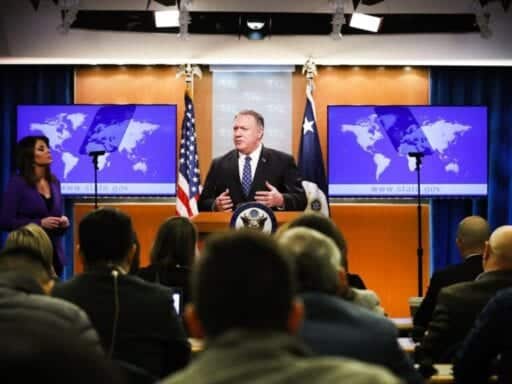It was initially about an “imminent” threat. But now Pompeo is talking about attacks that took place in the past.
The Trump administration’s justification for killing Maj. Gen. Qassem Soleimani, Iran’s top military commander, has subtly shifted since last Thursday. But the implications of that shift have profound implications in terms of the legality of an American action that has dramatically ratcheted up tensions in the Middle East.
Shortly after Soleimani was killed in a drone strike in Iraq last Thursday, the Department of Defense issued a statement arguing that the strike was justified as a self-defense measure.
“General Soleimani was actively developing plans to attack American diplomats and service members in Iraq and throughout the region,” the statement said. “This strike was aimed at deterring future Iranian attack plans.”
That claim was echoed by Secretary of State Mike Pompeo, who went on CNN on Friday and cited intelligence indicating Soleimani’s continued existence posed an “imminent” threat that put “dozens if not hundreds of American lives at risk.”
“This was an intelligence-based assessment that drove our decision-making process,” Pompeo said.
But four days later, Pompeo has stopped talking about intelligence of an “imminent threat” to justify the strike. Now, he’s mainly relying on the talking point that Soleimani had American blood on his hands and therefore had to go.
During a news conference on Tuesday, Pompeo was asked to share some specifics about the threat Soleimani posed. He responded by talking about Soleimani’s alleged role in an attack in Iraq that left an American contractor dead last month.
“We know what happened at the end of last year in December, ultimately leading to the death of an American,” Pompeo said. “So, if you are looking for imminence, look no further than the days that led up to the strike that was taken against Soleimani.”
REPORTER: Can you be specific about the imminent threat that Soleimani posed?
POMPEO: “We know what happened at the end of last year & ultimately led to the death of an American. If you are looking for immanence, look no further than the days that led up to the strike.” pic.twitter.com/yhqyNToZxd
— Aaron Rupar (@atrupar) January 7, 2020
But as Rep. Don Beyer (D-VA) alluded to on Twitter in response to Pompeo’s comments, news reports and vague claims about Soleimani’s possible role in future attacks is not the same thing as an “imminent threat.”
“The administration appears to be completely abandoning their previous claim that the killing was ordered to prevent specific attacks about which they had intelligence,” Beyer wrote.
The shift from what Pompeo said last Friday to what he said on Tuesday — a change that first became noticeable during a string of TV appearances on Sunday in which he tried to distance himself from the “imminent threat” talking point — has been echoed by the president himself.
During a radio interview with Rush Limbaugh on Monday, Trump said Soleimani “should have been taken out a long time ago” — a claim at tension with the idea that he posed an immediate threat.
OLD: There was an imminent threat
NEW: Soleimani should’ve been taken out a long time ago pic.twitter.com/8cdeIczXNN
— Aaron Rupar (@atrupar) January 7, 2020
This matters. The Trump administration has to establish that it had the legal authority to kill Soleimani. It could try to do that in a variety of ways, such as arguing that his killing was lawful under the terms of one of the Authorizations for the Use of Military Force (AUMFs), which Congress has given the executive branch over the years to do things like fight the Iraq War and go after terrorists groups like al-Qaeda.
But that could be a difficult case to make, since Soleimani is an Iranian (not Iraqi) military commander and not a member of al-Qaeda. So instead, the administration decided to use the legal justification that they were acting in self-defense and that Soleimani posed an “imminent threat.”
But some have questioned whether Soleimani actually posed an imminent threat. If he didn’t, that would poke a major hole in their argument that the strike was legally justified.
“Many of the people who have shaped our legal understanding of ‘imminent’ over the years understood it to mean that the threat was unfolding right now and there’s no time to do anything other than to kill the person,” Heather Hurlburt, a national security expert at the think tank New America, explained to my colleague Sean Illing. “The Soleimani killing doesn’t appear to meet that threshold.”
While Trump has made it clear in recent days that he doesn’t feel particularly constrained by either domestic or international law, questions about the legality of the Soleimani strike aren’t just academic — they could be hugely meaningful if the Iranian government follows through on its threats to retaliate against American interests.
As Hulbert explained, “it will be unfortunate if there are Iranian attacks that target Americans and we want other countries to help protect us and other countries say they’re not comfortable because we engaged in this illegal provocative act.”
The White House is scheduled to brief congressional leaders about the Soleimani strike on Wednesday. But Democratic lawmakers were unimpressed with the entirely classified formal notification about the strike that the Trump administration sent to Congress last Saturday, right around the same time Pompeo started moving the goalposts about the “imminent threat.”
House Speaker Nancy Pelosi said in a statement that the notification “raises more questions than it answers” and “compounds our many concerns, and suggests that the Congress and the American people are being left in the dark about our national security.”
The news moves fast. To stay updated, follow Aaron Rupar on Twitter, and read more of Vox’s policy and politics coverage.
Author: Aaron Rupar
Read More



